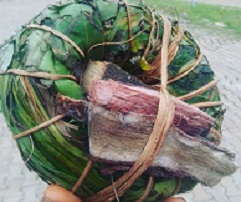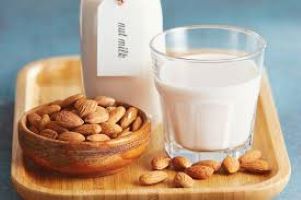Aju from Mbaise: Uses, Health Benefits and Side Effects
Aju from Mbaise: Uses, Health Benefits and Side Effects. Please watch:
Health Benefits of Aju from Mbaise
Aju from Mbaise is an herbal blend consisting of the bark, leaves, and roots of five different plants, including ginger, uda (Negro pepper), and uziza.
Traditionally used in the preparation of pepper soup and various medicinal concoctions, it is sought after for its numerous health benefits.
The term “Aju Mbaise” translates to “wrap from Mbaise,” referring to its origin in the village of Mbaise, Imo State. Despite its regional roots, the herb has gained popularity nationwide due to its acclaimed health properties.
Particularly favored by new mothers and those desiring weight loss, Aju from Mbaise is now commonly packaged as “slim tea” for convenient consumption.
Presented in wrapped leaves secured with small sticks, each component of Aju from Mbaise offers unique advantages.
Boiled without unwrapping, the herb-infused water is often enhanced with additional ingredients for taste.
While the brew carries a bitter-sharp flavor from its spices, its aroma is appealing. It can be enjoyed alone as a tea or used in cooking, though individuals seeking rapid results, such as those aiming to slim down, often prefer drinking the tea directly.

Health Benefits of Aju Mbaise
Nutritional and Phytochemical Properties of Aju Mbaise
In a 2019 study, researchers investigated the phytochemical composition of the ethanol extract of Aju from the Mbaise herbal mixture.
The findings revealed a significant presence of various phytochemicals in the herbal decoction.
The analysis identified alkaloids (8.69%), flavonoids (19.10%), glycosides (6.86%), hydrogen cyanide (0.92%), phenols (31.56%), saponins (0.83%), steroids (0.94%), tannins (16.80%), and terpenoids (14.31%).
In this article, we’ll explore some of the health benefits associated with Aju from Mbaise, shedding light on the advantages you can gain from incorporating this herb into your regimen.
1. Post-pregnancy Benefits
Aju from Mbaise is widely embraced by new mothers for its post-pregnancy recovery benefits. Primarily, it aids in replenishing essential nutrients depleted during pregnancy.
Additionally, it facilitates the reduction of postpartum abdominal bloating, restoring the stomach to its pre-pregnancy size.
Furthermore, Aju from Mbaise supports lactation by promoting breast milk production and assists in regulating the menstrual cycle post-delivery.
Moreover, a medical study conducted in 2016 revealed another potential health advantage of Aju from Mbaise.
The study findings indicated that the herbal decoction exhibited inhibitory effects on the proliferation of harmful bacteria in lactating mothers, further highlighting its therapeutic potential.
2. Weight Loss
Aju from Mbaise proves highly effective in aiding weight loss, particularly in reducing abdominal fat. Its mechanism involves breaking down fats into acids, facilitating their elimination from the body.
Additionally, it promotes metabolism, enabling the body to efficiently burn fat. These benefits extend to both women and men, making Aju from Mbaise a valuable asset in achieving healthy weight management goals.
3. Balance the menstrual cycle
Women experiencing irregularities in their menstrual cycle often turn to Aju from Mbaise to restore balance and promote regularity, resulting in a more predictable and consistent menstrual flow.
Additionally, it alleviates menstrual discomfort, offering relief to those who suffer from menstrual pain.
4. Womb Flusher
Women utilize Aju from Mbaise to cleanse their wombs, expelling residual blood, fluids, and any other debris accumulated post-childbirth.
This practice not only diminishes the size of the womb but also aids in abdominal reduction.
Furthermore, women who have experienced miscarriages or abortions utilize Aju from Mbaise to purge their wombs, fostering uterine health and mitigating potential complications in future pregnancies.
5. Tackle Fibroid and Tumor
Women also consume Aju from Mbaise herb to address early-stage fibroids or tumors, aiming to reduce their size and alleviate the discomfort caused by their growth.
6. Fertility Potion
Aju from Mbaise also enhances fertility in women by promoting uterine dilation and purification, rendering it conducive and prepared for pregnancy.
Side Effects of Aju Mbaise
The risks associated with consuming Aju from Mbaise are generally minimal, but caution is advised.
Pregnant women are advised to avoid the herb due to its potential to increase the risk of miscarriage and birth defects in babies.
Nursing mothers should also moderate their intake as it may impact the baby’s weight.
Common side effects include light-headedness or dizziness when consumed excessively, as well as increased hunger.
Overall, it’s important to consume the herb in moderation to mitigate any potential adverse effects.

People also ask
What is the composition of Aju in Mbaise?
Aju from Mbaise is a blend comprising ginger roots, traditional leaves, uziza seeds, uda, and the bark of a specific medicinal tree indigenous to Mbaise.
Uhiokirihio, or whole spice, is incorporated with the Aju from Mbaise leaves. This combination not only enhances the flavor but also acts as a fat-burning spice, targeting the reduction of starch in cooked meals.
How do you use dried aju from Mbaise?
Make sure to obtain the dried ingredients and blend them at the market.
Take one aju from Mbaise, wash it thoroughly without untying it, and place it in a pot along with the attached sticks.
Add one full spoon of the blended spices to the pot, then pour in enough water to cover the Aju. Cook for approximately 30 minutes, then remove from heat.
What are the medicinal properties of phyllanthus urinaria?
Phyllanthus urinaria, also known as chamber bitter or gripeweed, is indeed a widely distributed herb found in tropical regions across Asia, America, China, and the Indian Ocean islands. It’s a member of the Phyllanthus genus within the Phyllanthaceae family.
In various traditional medicinal practices, including folk medicine, P. urinaria is valued for its purported therapeutic properties. Some of the conditions it’s commonly used to treat include:
- Jaundice: It’s believed to have hepatoprotective properties, which may help treat jaundice by supporting liver function and promoting the elimination of bilirubin.
- Diabetes: Some studies suggest that extracts of Phyllanthus species, including P. urinaria, may have hypoglycemic effects, potentially helping to regulate blood sugar levels in individuals with diabetes.
- Malaria: Certain compounds found in Phyllanthus species have been investigated for their anti-malarial properties, although further research is needed to fully understand their efficacy and mechanisms of action.
- Liver diseases: Due to its hepatoprotective effects, P. urinaria is also used traditionally to support liver health and treat various liver disorders.
While anecdotal evidence and some scientific research is supporting the traditional uses of P. urinaria, it’s important to note that more clinical studies are necessary to confirm its effectiveness and safety for these purposes. As with any herbal remedy, it’s advisable to consult with a healthcare professional before using P. urinaria or any other herbal supplement, especially if you have underlying health conditions or are taking medications.
What are the benefits of dehydrating herbs?
Drying the herbs with a dehydrator at home shows you know you have preserved top-quality plants. It also lets you control the drying temperature and time—protecting your herbs’ health benefits, color, texture, aroma, and flavor and reducing damage and spoilage.
What do dehydrating herbs do?
The cell walls bring out the flavor. Dried herbs can be stored successfully for up to one year in a cool, dry, dark place.
Drying herbs at too high a temperature can result in flavor loss. The best time to harvest herbs for drying is before the flowers first open (the bursting bud stage).
What are the benefits of spice-infused water?
Here are a few of the benefits of spices when consumed in the morning shared by Sharanya:
- Drinking spices soaked in water can prevent the onset of inflammation in the body.
- They have anti-inflammatory properties and antioxidants to the body.
- They help in boosting metabolism.
- Improve digestion.
- Relive constipation.
Is Phyllanthus good for the liver?
Phyllanthus niruri is a persistent herb customarily used for a wide range of diseases, including diarrhea, jaundice, dyspepsia, kidney stones, and genitourinary infections
It is mainly renowned in Malay, Chinese, and Ayurvedic medicine for its usage in liver and kidney ailments
What are the benefits of drinking phyllanthus amarus?
Amaris is an essential plant of the Indian Ayurvedic system of medicine which is used in the treatment of the stomach, liver, genitourinary system, kidney, and spleen.
It is bitter, stomachic, diuretic, astringent, febrifuge and antiseptic. The whole plant is used in menorrhagia, gonorrhea, and other genital affections.


